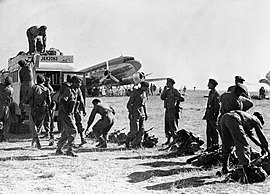
Indian soldiers during the 1947–1948 war. Image credit en.wikipedia.org
by Muhammad Ahmad Khan 4 November 2022
War never brings victory without a cost. For some, it is an event of grief for their loss, while for some, it leads to the ultimate achievement. So did World War II when decolonization started in the aftermath of Britain becoming unable to manage these extended areas of influence. Pakistan and India also gained independence from the shackles of British colonization. But some issues between the two countries remained unresolved that kept on dragging them into conflict. 27th October 1947, when Kashmir ruler Shriman Inder Mahinder Rajrajeswar Maharajadhiraj Shri Hari Singhji signed the Instrument of Accession (IoA) with India, brought unending controversies in the current political dynamics of South Asia. Regarding India’s actions in Kashmir, there are two issues. First is the legitimacy of the IoA, and second is the legitimacy of India’s actions according to the IoA.

Pakistani soldiers during the 1947–1948 war. Image credit en.wikipedia.org
There were 580 states at the time of the partition of the subcontinent, which also stood to look after their upcoming fate. There were given a choice, of whether to remain as an independent country or to sign IoA with Pakistan or India based on their interests. It was agreed that the states themselves would decide the fate of their people. As was expected, the states with Muslim majority came to Pakistan with some exceptions, and states with Hindu populations allied with India. Kashmir, which was also a state under Dogra rule but with Muslim populations, remained unresolved. And that is why the signing day of Kashmir’s IoA is called the Black Day for not just Kashmiris because it was signed against their will, but also for the international community because of India’s illegal actions in the valley.
The dominant but controversial perspective around the world is the IoA by Kashmir’s ruler at the time was signed on 26th October as the result of tribesmen entering from Pakistan to the valley to free Kashmir. Resultantly, India sent its forces to Srinagar to push the tribesmen back. V.P Menon, the man who had to get the IoA signed by the Maharaja, wrote in his book that he traveled from Delhi to Jammu for the signature on 26th October. Analysts have debunked this narrative by analyzing the technicalities. On 26th October, Maharaja with his family left Kashmir by road in the early hours of the day and could only reach Jammu after 7 PM. Kashmir Observer quotes Alexander Symon, British Deputy High Commissioner to New Delhi, saying that he had met Menon on 26th October in Delhi and later had told about his leaving on 27th October. Indian Foreign Minister Jawaharlal Nehru’s letter of 27th October to the Maharaja also shows the signing of IoA on 27th October. It means the IoA was signed after the Indian troops landed in Srinagar. Secondly, there is a vogue narrative that Indian forces entered the valley after the tribesmen movement. Indian Government’s ‘Operation Rescue’ in Kashmir was initiated between the 12th and 17th of October 1947, before the tribesmen movement. Besides debunking all these narratives, one must ignore the injustice Mountbatten did with impunity to Pakistan by giving the state of Gurdaspur to India. Other analysts like Dr. Abdul Ahad, a historian, and author of several books, have called IoA a bogus document based on archival material.
The second issue after challenging the legitimacy of the signing of the IoA is India’s actions according to the agreed document. The document allowed India only to make decisions regarding the state’s defense, and external and communication affairs. The IoA strongly prohibits any acceptance of any future constitution of India by the state, any buying of territory in the region, and any amendment in the IoA. It looks more like a binding treaty between the two countries. Any ruler Hari Singh or coming afterward, had to remain sovereign. Initially, India made two laws, Article 370, and 35A, determining the IIOJ&K’s self-determination and integrity. But the BJP government, on August 5, 2019, revoked this special status of Kashmir, which is illegal by all means and must concern the whole international community. After revoking this self-determination of Kashmiris, they have come directly under the central government. India afterward is carrying illegal actions like human rights violations and changing the demography as well as impacting the political dynamics of the region, with impunity. Amnesty International has often issued a report on Human Rights violations by Indian forces in Kashmir. But these non-state actors can only raise the issue until it gets the attention of the major states. Western countries, the champions of democracy and human rights, are silent on India’s actions in the valley. It does not just challenge their credibility, but also the values they are promulgating.
Concluding, India’s actions in the valley are challenging from the very start. The IoA is controversial to be accepted. Even if the document is accepted as actually existing, the actions India is taking are illegal by all means and violate the legitimacy of the document. Pakistan, as a responsible and peaceful state, will keep raising the Kashmir issue on international forums. With its firm stand, Pakistan challenges every illegal taken by India, for the people of Kashmir.
